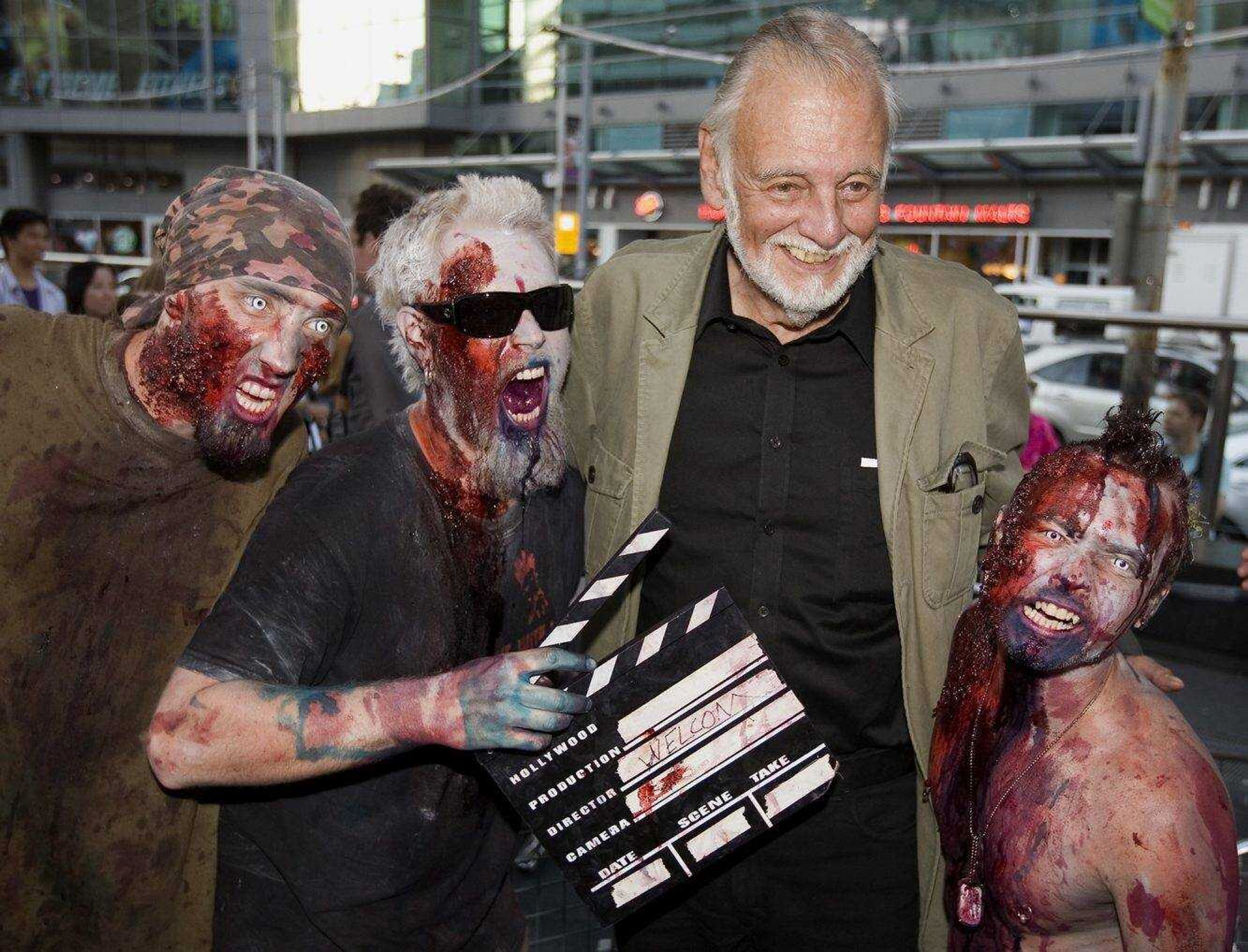George A. Romero, father of the zombie film, dies at 77
NEW YORK -- George Romero, whose classic "Night of the Living Dead" and other horror films turned zombie movies into social commentaries and who saw his flesh-devouring undead spawn countless imitators, remakes and homages, has died. He was 77. Romero died Sunday following a battle with lung cancer, said his family in a statement provided by his manager Chris Roe. ...
NEW YORK -- George Romero, whose classic "Night of the Living Dead" and other horror films turned zombie movies into social commentaries and who saw his flesh-devouring undead spawn countless imitators, remakes and homages, has died. He was 77.
Romero died Sunday following a battle with lung cancer, said his family in a statement provided by his manager Chris Roe. Romero's family said he died while listening to the score of "The Quiet Man," one of his favorite films, with his wife, Suzanne Desrocher, and daughter, Tina Romero, by this side.
Romero is credited with reinventing the movie zombie with his directorial debut, the 1968 cult classic, "Night of the Living Dead." The movie set the rules imitators lived by: Zombies move slowly, lust for human flesh and can be killed only when shot in the head. If a zombie bites a human, the person dies and returns as a zombie.
Romero's zombies, however, were always more than mere cannibals. They were metaphors for conformity, racism, mall culture, militarism, class differences and other social ills.
"The zombies, they could be anything," Romero said in 2008. "They could be an avalanche, they could be a hurricane. It's a disaster out there. The stories are about how people fail to respond in the proper way. They fail to address it. They keep trying to stick where they are, instead of recognizing maybe this is too big for us to try to maintain. That's the part of it that I've always enjoyed."
"Night of the Living Dead," made for about $100,000, featured flesh-hungry ghouls trying to feast on humans holed up in a Pennsylvania house. In 1999, the Library of Congress inducted the black-and-white masterpiece into the National Registry of Films.
Romero's death was felt across a wide spectrum of horror fans and filmmakers. Stephen King, whose "The Dark Half" was adapted by Romero, called him his favorite collaborator and said, "There will never be another like you."
"('Night of the Living Dead') was so incredibly DIY I realized movies were not something that belonged solely to the elites with multiple millions of dollars but could also be created by US, the people who simply loved them, who lived in Missouri, as I did," wrote James Gunn, the "Guardians of the Galaxy" director, who penned the 2004 remake of "Dawn of the Dead."
Romero's influence could be seen across decades of American movies, from John Carpenter to Edgar Wright to Jordan Peele, the "Get Out" filmmaker. Many considered "Night of the Living Dead" to be a critique on racism in America.
The sole black character survives the zombies, but he is fatally shot by rescuers. Peele on Sunday tweeted a photo of that character, played by Duane Jones, and wrote: "Romero started it."
Ten years after "Night of the Living Dead," Romero made "Dawn of the Dead," in which human survivors take refuge from the undead in a mall, then turn on each other as the zombies stumble around the complex.
Film critic Roger Ebert called it "one of the best horror films ever made -- and, as an inescapable result, one of the most horrifying. It is gruesome, sickening, disgusting, violent, brutal and appalling. It is also ... brilliantly crafted, funny, droll and savagely merciless in its satiric view of the American consumer society."
"He really was what you didn't expect. He was incredibly gentle," said Gaylen Ross, who starred in "Dawn of the Dead" and 1982's "Creepshow." ''He had this optimistic purity about friendship and honor. No matter how insane the demands were on the film, I never saw a crew that was so willing to do whatever they needed for George."
Romero had a sometimes combative relationship with the genre he helped create.
He called "The Walking Dead" a "soap opera" and said big-budget films such as "World War Z" made modest zombie films impossible. Romero maintained he wouldn't make horror films if he couldn't fill them with political statements.
"People say, 'You're trapped in this genre. You're a horror guy.' I say, 'Wait a minute; I'm able to say exactly what I think,' " Romero told the AP. "I'm able to talk about, comment about, take snapshots of what's going on at the time. I don't feel trapped. I feel this is my way of being able to express myself."
Connect with the Southeast Missourian Newsroom:
For corrections to this story or other insights for the editor, click here. To submit a letter to the editor, click here. To learn about the Southeast Missourian’s AI Policy, click here.










